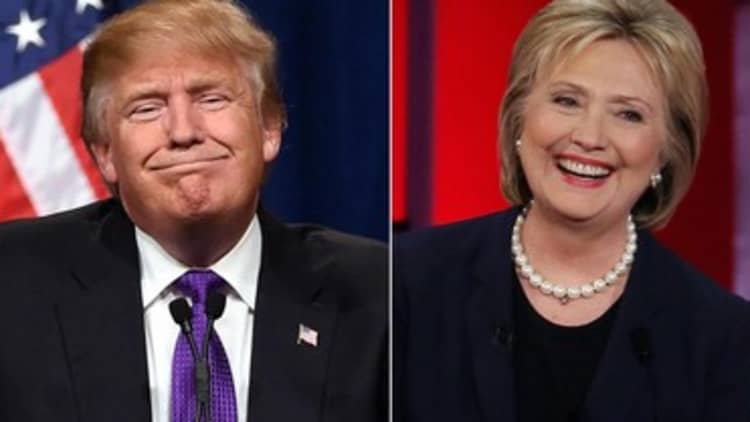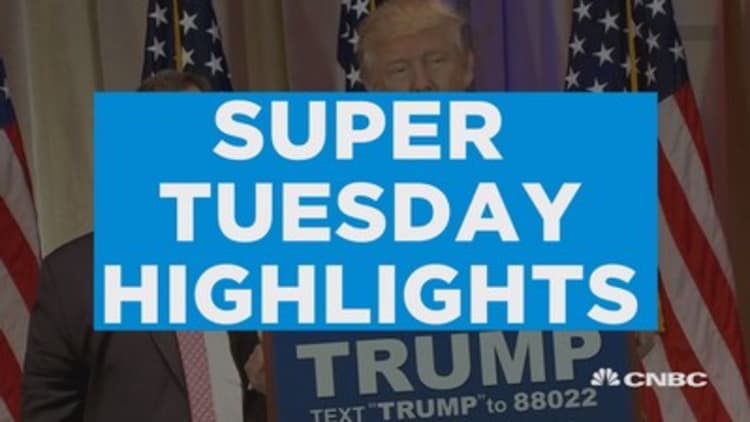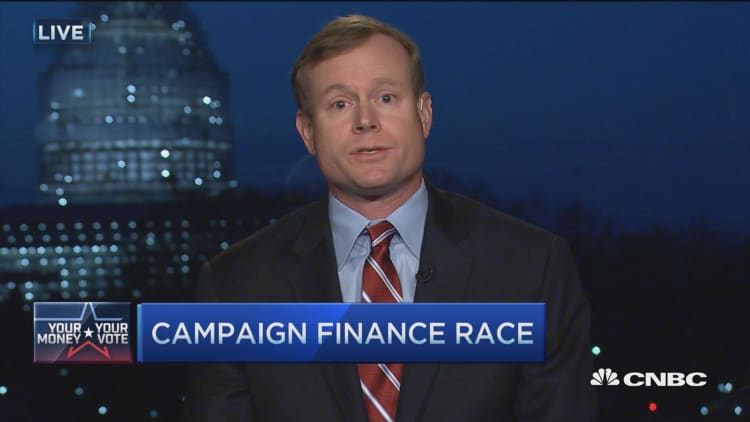


Businessman Donald Trump walked away from Super Tuesday with a strengthened claim to the GOP nomination, but both of his chief national rivals notched wins that will most likely propel them onto the next series of contests.
Trump was the projected winner of GOP primaries in Virginia, Vermont, Georgia, Tennessee, Arkansas, Massachusetts and Alabama, NBC News reported.
U.S. Sen. Ted Cruz, meanwhile, won Oklahoma and his home state of Texas, NBC projected. And U.S. Sen. Marco Rubio of Florida was the projected winner of the Minnesota GOP caucus. Ted Cruz was projected to win Alaska, the final of the 11 states holding GOP contests on Tuesday, NBC News said.
In a Tuesday night address, Trump struck a general election tone, saying he has expanded the Republican party's voter base and hitting Democratic front-runner Hillary Clinton in his speech.
"I am a unifier, I know people are going to find that a little bit hard to believe, but believe me that I am a unifier," Trump said. "Once we get all of this finished, I am going to go after one person — that's Hillary Clinton."
"When we unify, there's nobody — nobody — that's going to beat us," he said at the conclusion of his victory speech.
Real estate magnate Trump was the favorite to win all but the Texas primary during the March 1 contests, according to betting markets and recent state polls. Trump has led nearly every recent national GOP poll, and he secured the most Republican delegates ahead of Tuesday.
Texas's Cruz, who won the first GOP test of the year when he defeated Trump in the Iowa caucus, had been banking on a Texas victory to help maintain his campaign's momentum after successive losses in Nevada, South Carolina and New Hampshire.
"I believe we're going to do very very well here in Texas," Cruz said earlier Tuesday. "It's going to be up to Texans to make their decision, but there is no doubt that any candidate who cannot win his home state has real problems."
That comment may have been directed at GOP hopeful Rubio, a U.S. senator from Florida, who trails Donald Trump by double digits in Sunshine State polls. Florida doesn't vote until March 15, but Rubio has yet to record a win during the primary season, so his campaign is hoping to build up some steam before that contest.
An apparent favorite of Republican leadership, Rubio had yet to turn endorsements and big donations into outright state victories before Tuesday — although he had won 16 delegates going into the day, compared to Cruz's 17. For his part, Trump entered Super Tuesday with 82 delegates.
"I know it was a very tough night for Marco Rubio — he had a tough night," Trump said in a Tuesday evening address. "We're going to go to Florida, we're going to spend so much time in Florida."
The states holding the GOP's delegate-binding contests on Tuesday were Alabama, Alaska, Arkansas, Georgia, Massachusetts, Minnesota, Oklahoma, Tennessee, Texas, Vermont and Virginia. There were 595 Republican delegates up for grabs in those tests.
Also in the race are Ohio Gov. John Kasich — the second-place finisher in New Hampshire who pundits say is competing with Rubio in the GOP's so-called establishment track — and retired surgeon Ben Carson. The former director of pediatric neurosurgery at Johns Hopkins Hospital has seen his campaign's fortunes steadily eroding after challenging Trump as national front-runner in November.
Early exit polls showed that the GOP contests in Massachusetts, Vermont and Virginia had the lowest percentage of voters identifying as very conservative, according to NBC News. Overall, 38 percent of voters in Super Tuesday GOP primaries said they identified as very conservative, 42 percent as somewhat conservative, 18 percent as moderate and 2 percent as liberal.
About 42 percent of Super Tuesday Republican primary voters said they had made their decision about which candidate to vote for more than a month ago, according to early exit poll data from NBC News. That data also showed that 22 percent made up their minds in the last few days, another 10 percent in the last week, and another 24 percent in the last month.
Other early exit poll results indicated that Republican primary voters are split on their ideal candidate's background: 50 percent said they want the next president to come from outside the establishment, and 40 percent said they wanted someone with political experience.
On the proposition of a ban on Muslims, 85 percent of Trump voters in the GOP's Super Tuesday primaries said they support the measure, but that fell to 60 percent for other Republican candidates' voters, according to NBC News early exit polls.




